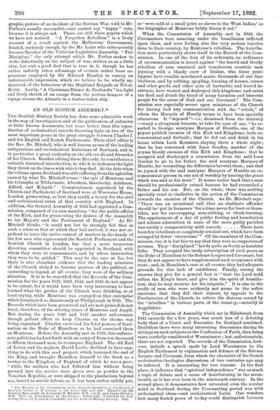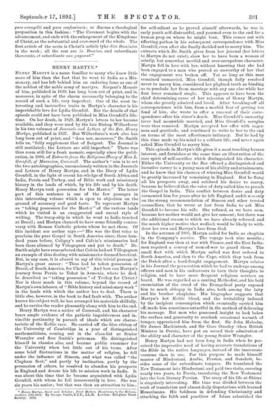AN OLD SCOTCH ASSEMBLY.*
THE Scottish History Society has done some admirable work in the way of investigation and of the publication of unknown or little known documents, but none better than this repro- duction of ecclesiastical records throwing light on two of the most important years in the great struggle between Charles I. and his English and Scotch Parliaments. Their chief editor is the Rev. Dr. Mitchell, who is well known as one of the leading antiquarians and ecclesiastical historians of Scotland, and is, in particular, a great authority on the old creeds and formulas of his Church. Besides editing these Records, he contributes a valuable historical introduction, in which he indicates the light they throw on the times with which they deal. At the date when the volume opens, Scotland was still suffering from the agitation caused by what Dr. Mitchell terms "the epic of Montrose and his triumphs at Tibbermuir, Aberdeen, Inverlochy, Auldearn, Alford, and Kilsyth." Commissioners appointed by the Church and Parliament of Scotland were at Worcester House, London, prosecuting, as best they could, a treaty for the civil and ecclesiastical union of that country with England. In addition, the General Assembly of 1642 had appointed a Com- mission, composed of its own members, "for the public affairs of the Kirk, and for prosecuting the desires of the Assembly to his Majesty and the Parliament of England." As Dr. Mitchell thinks, "it could not but be strongly felt that in such a crisis as that at which they had arrived, it was not ex- pedient to leave the entire control of matters in the hands of the few men who represented the Scottish Parliament and the Scottish Church in London, but that a more numerous directing committee should be appointed in Scotland, with whom they were to communicate, and by whose instruction they were to be guided." This may be the case so far, but there is also abundant evidence that the leading ministers of the Church wished to become masters of the political, as (according to legend, at all events), they were of the military situation. It is to be regretted that the Records of the Com- mission for the years 1642, 1643, 1644, and 1645 do not appear to be extant, for it would have been very interesting to have learned what the guides of the Church were thinking, or at least saying, while Montrose was engaged on that enterprise . which terminated so disastrously at Plailiphaugh in 1645. The Records which have been preserved and are now printed do not treat, therefore, of the stirring times of Montrose and Argyll. But daring the years 1646 and 1647 another unfortunate though gallant effort to keep Charles on the throne was being organised. Charles exercised his fatal powers of fasci- nation on the Duke of Hamilton as he had exercised them on Montrose. Before the Assembly met in 1648, this unfortu- nate politician had set forth with an army of from ten thousand to fifteen thousand men, to reconquer England. The old Earl of Leven and his nephew, David Leslie, declined to have any- thing to do with this mad project, which hastened the end of the King, and brought Hamilton himself to the block as a traitor to the Kingdom of England, of which he was a peer; "while the soldiers who had followed him without being pressed into the service were given over as powder to the Venetian Republic, or were shipped to the plantations beyond sea, bound to servile labour, as it has been rather mildly put, • The Reor,Ye of the rommissicns of the General Assemblies of the Church of Scotland holden in E inhurgh in the Years 1615 and 1847 Edited f om the Original Manuscript by Alexander F. Mitchell, D.D., I.L.D , and James Christ o, D.D. With an Introduction by the former. Edinburgh : Printed at the 'Uni- versity Press, by T. and A. Constable, for the Scottish History Society. 1892.
or 'were sold at a small price as slaves to the West Indies,' as the biographer of Montrose boldly blurts it out."
When the Commission of Assembly met in 1646, the Covenanters were smarting under the humiliation inflicted upon them, and were feeling also the very serious injuries done to their country, by Montrose's rebellion. The humilia- tion more particularly shows itself in the Record of the Com- mission. In one of the first of its oedemas, an ordinance of excommunication is issued against "the horrid and bloody rebellion of sum wnatural and treacherous countrie men joyning with a bloody crew of Irishes, who these years bygone have cruellie murthered manic thousands of our dear brethren, and by robbing, spoyling, burning of houses, comes and other goods, and other acts of barbaritie and horrid in- solencie, have wasted and destroyed this kingdome, and eaten the flesh and drunk the blood of many harmless and innocent people for the cause of God and our Covenant." The Com- mission was especially severe upon ministers of the Church for having had any communication with the "rebels," of whom the Marquis of Huntly seems to have been specially obnoxious. It "deposed "—i.e., dismissed from the ministry —many a clergyman because, to take the case of one, "he re- sorted to George, somtyme Marques of Huntlie, one of the pryme publick enemies of this Kirk and liingdome, both ex- communicat and forfault ; that he did eat and drink in his house within Loch Kenmore, staying there a whole night ; that he has conversed with Lues Gordon, another of the pryme bloody enemies of this Kirk and Kingdome ; that he accepted and discharged a commission from the said Lues Gordon to go to his father, the said somtyme Marquee of Huntlie, for reconciling the differences betwixt them ; and that he joyned with the said somtyme Marques of Huntlie an ex- communicat person in one act of worship by hearing the grace which wes said at his meat." It seems rather hard that a man should be professionally ruined because he had reconciled a father and his son. But, on the whole, there was nothing specially cruel or vindictive in the action of the Commission towards the enemies of the Church. As Dr. Mitchell says: "There was an occasional call that an obstinate offender should be put in fermance 'for a time, never for boot or thum- bikin, nor for ear-cropping, nose-slitting, or cheek-burning. The appointment of a day of public fasting and humiliation and solemn admonition in some of the more guilty parishes was surely a comparatively mild aniende There have been few rebellions so completely crashed out, which have been avenged by fewer executions." Of the members of the Com- mission, too, it is but fair to say that they were no respecters of persons. They " disciplined " lairds quite as freely as humbler folks. They accepted the tardy subscription of such peers as the Duke of Hamilton to the Solemn League and Covenant, but they do not appear to have supplemented such acceptance with trust ; and, in Hamilton's case at all events, they had adequate grounds for this lack of confidence. Finally, among the reasons they give for a general fast is "that the Lord wold soften the King's heart, and give him the spirit of humilia- tion, that he may mourne for his iniquitie." It is also to the credit of men who were evidently not prone to the softer emotions, that they did their utmost, by appeals to the Presbyteries of the Church, to relieve the distress caused by the " rebellion " in various parts of the country,—notably in Argyllshire.
The Commission of Assembly which sat in Edinburgh from 1642 onwards for a few years, was much less of a debating body than of a Court and Executive for Scotland combined. Doubtless there were many interesting discussions during its sittings on such subjects as the Confession of Faith, then being more carefully considered at Westminster ; but, unfortunately, these are not reported. The records of the Commission, how- ever, include a speech made by Lord Warristoun to the English Parliament in explanation and defence of the Solemn League and Covenant, from which the character of the Scotch ecelesiastico-theologico discussions of two centuries ago may be inferred. It is interesting for two reasons. In the first place, it indicates that "spiritual independence" was as much a topic of debate and a cause of heartburning in the seven- teenth, as it has ever been in the nineteenth century. In the second place, it demonstrates how saturated even the secular mind in Scotland daring the Covenanting period was with ecclesiastical ideas—and ecclesiastical Latin. One wonders how many Scotch peers of to-day could distinguish between pars evangelii and pars confessionis ; or discuss a theological proposition in this fashion : "The Covenant begins with the advancement., and ends with the enlargement of the Kingdome of Christ, as the substantial and over-word of the whole. The first article of the sevin is Christ's article lyke dies Dominica in the week ; all the rest are in Domino, and subordinate thereunto, et subordinata non pugnant."



































 Previous page
Previous page